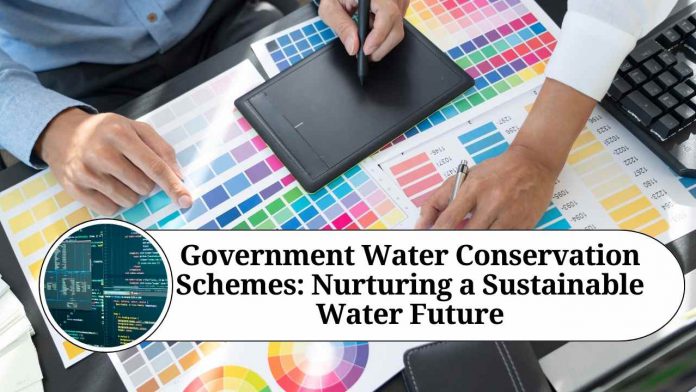Introduction:
Water conservation has become an increasingly pressing issue in today’s world. As populations grow and climate change intensifies, ensuring access to clean water for all has become a global challenge. Recognizing the importance of conserving water resources, governments around the world have initiated various schemes and programs to promote sustainable water management. In this blog, we will explore some notable government water conservation schemes that aim to address this critical issue.
- India: Jal Shakti Abhiyan
The Jal Shakti Abhiyan (Water Power Mission) was launched by the Government of India in 2019. It focuses on water conservation and rejuvenation of traditional water bodies, watershed development, and promoting water-use efficiency in agriculture, industry, and domestic sectors. The program aims to make water conservation a people’s movement by involving local communities in water-related initiatives and creating awareness about water scarcity and its management.
- Australia: Water Efficiency Labelling and Standards Scheme (WELS)
Australia’s WELS scheme was introduced in 2005 to promote water conservation in households. It requires products such as showers, toilets, washing machines, and dishwashers to display a water efficiency label. The scheme provides consumers with information about the water efficiency of products, enabling them to make informed choices and reduce water consumption in their homes.
- United States: WaterSense Program
The WaterSense program, initiated by the U.S. Environmental Protection Agency (EPA), promotes water-efficient practices and products. It certifies products like toilets, faucets, showerheads, and irrigation systems that meet strict water efficiency and performance criteria. By choosing WaterSense-labeled products, consumers can reduce water usage, save money, and contribute to water conservation efforts.
- Singapore: NEWater
Singapore, known for its limited water resources, has implemented the NEWater program to tackle water scarcity. NEWater is high-grade reclaimed water produced through advanced purification and treatment processes. It is used for industrial purposes, including wafer fabrication, cooling towers, and in some instances, indirect potable use. This initiative has significantly reduced Singapore’s reliance on imported water sources.
- Israel: Water Conservation and Reuse
Israel is a world leader in water conservation and has successfully implemented numerous innovative schemes. The country has established extensive water recycling systems, desalination plants, and advanced irrigation techniques such as drip irrigation. By maximizing the use of limited water resources, Israel has transformed its arid regions into productive agricultural areas and become a model for water-stressed regions worldwide.
- China: South-North Water Transfer Project
The South-North Water Transfer Project in China is an ambitious undertaking to address regional water scarcity. It involves transferring water from the water-rich south to the drier north through three canal routes. The project aims to alleviate water shortages, improve water quality, and promote sustainable economic and social development in the northern regions of China.
Conclusion:
Water conservation is an urgent global priority, and governments play a crucial role in implementing sustainable water management practices. The aforementioned government water conservation schemes are just a few examples of initiatives taken around the world. These programs focus on various aspects such as community engagement, water efficiency labeling, reclaimed water, and large-scale water transfer projects. By promoting awareness, efficient water use, and technological advancements, these schemes strive to ensure a sustainable water future for generations to come. However, individual responsibility and collective action are equally important in achieving meaningful water conservation outcomes. Let us embrace these schemes, make conscious choices, and contribute to preserving our most precious resource: water.
Read more useful content:
Frequently Asked Questions (FAQs)
Q1: What is the importance of water conservation?
A1: Water conservation is crucial for several reasons. It helps ensure a sustainable supply of clean water for present and future generations, reduces the strain on water sources, protects ecosystems, mitigates the effects of droughts, and promotes efficient water use in various sectors.
Q2: How can I contribute to water conservation at home?
A2: There are several simple steps you can take at home to conserve water. These include fixing leaky faucets and pipes, installing water-efficient fixtures, using water-saving appliances, practicing shorter showers, collecting rainwater for irrigation, and being mindful of unnecessary water usage.
Q3: What are some water conservation tips for the garden or landscaping?
A3: To conserve water in your garden, consider watering plants early in the morning or late in the evening to minimize evaporation, use mulch to retain soil moisture, choose native or drought-tolerant plants, group plants with similar water needs together, and use drip irrigation systems instead of sprinklers.
Q4: Are there any financial incentives for water conservation?
A4: Many governments and water utilities offer financial incentives to encourage water conservation. These may include rebates for purchasing water-efficient appliances, tax incentives for implementing rainwater harvesting systems, and reduced water rates for low water usage.
Q5: How can industries contribute to water conservation?
A5: Industries can contribute to water conservation by implementing water recycling and reuse systems, optimizing their processes to minimize water consumption, adopting water-efficient technologies, and raising employee awareness about the importance of water conservation.
Q6: What is the role of agriculture in water conservation?
A6: Agriculture is a significant water-consuming sector, and adopting water-efficient practices is crucial. Techniques such as drip irrigation, precision farming, soil moisture monitoring, crop rotation, and using drought-resistant crop varieties can help reduce water usage in agriculture while maintaining productivity.
Q7: How do government water conservation schemes involve communities?
A7: Government water conservation schemes often involve communities through awareness campaigns, educational programs, and active participation. They encourage community members to adopt water-saving practices, engage in rainwater harvesting, participate in watershed management initiatives, and report water-related issues.
Q8: Can desalination be an effective solution for water scarcity?
A8: Desalination is a process that converts seawater into freshwater, but it is energy-intensive and expensive. While it can be a viable option in coastal areas with limited freshwater sources, it is important to combine desalination with other water conservation measures to ensure a sustainable and balanced approach.
Q9: How does climate change impact water conservation efforts?
A9: Climate change can exacerbate water scarcity and variability. Rising temperatures, changing rainfall patterns, and increased frequency of extreme weather events affect water availability. Adapting water management strategies to account for these changes and implementing resilient infrastructure are essential in water conservation efforts.
Q10: Can individual efforts in water conservation make a difference?
A10: Absolutely! Individual efforts collectively have a significant impact on water conservation. By being mindful of our water usage, adopting water-saving habits, and spreading awareness within our communities, we can contribute to the conservation of this precious resource and inspire others to do the same.




















